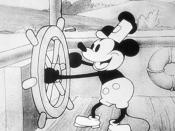Art Spiegelman was brilliant in creating a comic that portrays a survivors tale of the Holocaust. Although Vladek's story told in Art Speigelman's Maus is similar to many survivor stories of the Holocaust, it is portrayed in such a different and intriguing way. Ultimately, the use of the comic book format helps to make this work a tremendous success, both historically and culturally. What makes Maus so interesting compared to traditional oral history or story book format is that in this pictorial format we can see far beyond the set forth details and facts, and it allows us to dig deeper into the rhyme and reason between the lines; we can almost place ourselves in the story. As Newsweek quotes, "... the very artificiality of its surface makes it possible to imagine the reality beneath." Maus is in many ways focused on the character of Vladek and his recollection of his life leading up to the Holocaust, during and after; but focusing on Artie, Vladek's son's character, it is apparent that he is a more complex one.
At first glance, one might be tempted to see Vladek as the main character. After all, the central narrative describes his experiences, and he, or at least his symbolic equivalent, is our main contact with the horrible Holocaust experiences we witness. However, there are some problems here. To begin, Vladek is not a particularly complex or sympathetic figure either before, during, or after the war. He survives largely as a matter of luck, combined with a good native intelligence; his experiences have left him crippled emotionally, and he has learned nothing particularly meaningful as a result of his experiences. There's little sense that he understands or has even attempted to understand his experiences and its effects on him. They haven't...


